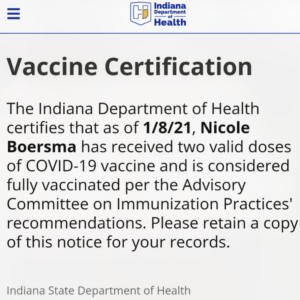
Who should not get vaccinated (right now)?
Vaccine eligibility in Indiana (this is where I live, so it’s the state whose health department notifications I receive) was updated this morning to include people ages 65 and up. If you (or your loved one) need to sign up then it can be done through ourshot.in.gov or by calling the 211 line. Your local Area Agency on Aging (wow, say that three times fast) can also assist you. If you or your loved one are a long-term care resident then several pharmacy groups have been working to vaccinate people where they live. If you are a health care worker or you come into regular contact with infectious material then you can also be vaccinated (ourshot.in.gov or 211).
I’m told that your public library may be another place where you can get help signing up for your vaccine (I cannot say enough good things about public libraries)!
My Facebook feed is full of people I love getting vaccinated on a regular basis, and I’m so excited about that! I do want to cover a question I promised I would come back to in more detail, though:
Do you have any info on not getting a vaccine if you have allergies?
Things I know should make you talk to your doctor or delay signing up:
- If you have a known allergy to PEG (polyethylene glycol), polysorbate, or any other of the (very short) list of vaccine components, talk to your doctor before you sign up because you may be at increased risk of an allergic reaction
- If you have a history of severe reactions or anaphylaxis to another vaccine or infused (IV) medication, talk to your doctor to make a decision based on your particular case.
- If you had your first shot and had anaphylaxis (or any serious reaction) to that shot, talk to your doctor before you commit to another.
- If you have dermal fillers (a type of injectable treatment for wrinkles and aging skin) then your response to the vaccine may include a (treatable, mild) reaction at those sites and you should talk to your doctor to know what to expect.
- If you are actively under quarantine for COVID-19 exposure please don’t come in to get vaccinated while you are under quarantine. We don’t think your immune response will be fast enough to prevent development of COVID-19 and you’ll expose everyone at the vaccination site.
- If you are positive for COVID-19 please wait until your isolation period is over and your symptoms are resolved. You may consider delaying a little longer (up to 60-90 days), depending on your personal risks of exposure and the vaccine supplies where you are located.
- If you’ve had another vaccine (flu, shingles, pneumonia shot, etc) you should wait 14 days before your coronavirus vaccine (and wait 14 days after it before you get any other vaccines) because we don’t know if there are any interactions that would affect your immune system’s response.
- If you received a monoclonal antibody infusion for COVID-19 specifically, we are recommending you wait 90 days after the infusion, because we don’t know exactly how those synthetic antibodies will interact with the vaccine.
- If you have HIV or are immunocompromised, we have some data on how the vaccines work, but not as much as for people with more robust immune systems. These vaccines CANNOT give you COVID-19 (remember that post on how they work?) but you should talk to your doctor about the latest information.
- If you are in super fragile health and a day or two of feeling awful might actually kill you, talk to your doctor before you get your shot.
And one more: If you are pregnant.
The World Health Organization has released a statement about pregnant people and the Moderna coronavirus vaccine, and it’s just about as long as anything I could have written. I’ll try to summarise:
“We don’t have enough data about this vaccine in pregnant people to make a definite statement about its safety (or about how well it works). The science behind the vaccine suggests that it should be safe, and animal studies have not shown any harm, but until we have a meaningful amount of data from actual pregnant people, you should talk with your doctor about your personal risk of contracting COVID-19 and severe disease, then make a decision based on the benefits to you and the fact that we don’t know for sure whether there are risks.”
That’s still a lot. The CDC’s recommendations at this point take a couple of pages and are roughly the same (“people who are pregnant and part of a group recommended to receive a COVID-19 vaccine may choose to be vaccinated”)
What this amounts to is: We think this is probably safe, but we don’t have the data to back it up yet, and as responsible scientists we feel that we need to tell you we are making an educated guess about the safety of these vaccines in pregnant people.
That’s a pretty long and relatively specific list of reasons not to get vaccinated.
A couple of things that are not on the list:
- Medications: I am not currently aware of any medications (other than the vaccines and monoclonal antibodies I mentioned above) that are a concern with the COVID-19 vaccines. The trials were performed on people with a variety of common diseases, and people were instructed to keep taking their regular medications. There’s no noted concern in the published data for any medication interactions.
- There’s been a little chatter about whether it’s okay to use acetaminophen, ibuprofen, and aspirin type medications to treat your post-vaccine symptoms. A review paper published in 2016 looked at the available data on whether these medications affected your immune response. It turns out that they might decrease your response a little bit! However, that effect is small, and because vaccines are designed to create a robust (strong) immune response, it may not make a real-world difference. We don’t know for sure.
- Asthma: We are good to go, asthmatics! If you have particularly severe asthma, then check with your doctor.
Happy vaccinating!
- References for today:
Interim recommendations for use of the Moderna mRNA-1273 vaccine against COVID-19The Moderna COVID-19 (mRNA-1273) vaccine: what you need to know
Vaccination Considerations for People who are Pregnant or Breastfeeding
Interim Clinical Considerations for Use of mRNA COVID-19 Vaccines
ACAAI Guidance on Risk of Allergic Reactions to mRNA COVID-19 Vaccines – ACAAI Member
Effect of antipyretic analgesics on immune responses to vaccination
